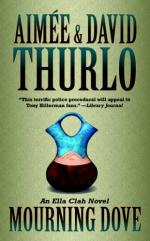|
This section contains 5,647 words (approx. 19 pages at 300 words per page) |

|
Dictionary of Literary Biography on Mourning Dove
The works of Mourning Dove (Humishuma) are vital to an understanding of the settlement/assimilation period (1880s-1930s) on Native peoples, and they are also a crucial link in the evolution of Native American literature. As a novelist Mourning Dove focused on the difficult issues of mixed-blood heritage and the vulnerability of Indians to white exploitation, as well as the incorporation of Indian storytelling into the Western romance, making Cogewea, the Half-Blood: A Depiction of the Great Montana Cattle Range (1927) the first truly bicultural novel to convey an Indian worldview. Her reflections on her life in what would be titled Mourning Dove: A Salishan Autobiography (1990) provide the most thorough revelation of assimilation pressures on a collapsing Indian culture now in print. In the face of that potential annihilation, Coyote Stories (1933) demonstrates the choice to keep the Salish oral heritage alive by utilizing the literary forms of the conquering...
|
This section contains 5,647 words (approx. 19 pages at 300 words per page) |

|


